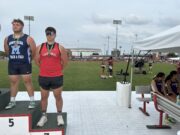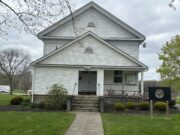“This is why they go into education! Our instructors are eager to share their knowledge and to spark interest among students in a significant, meaningful way.”
This comment by Kent State Geauga and Regional Academic Center Assistant Dean Dr. Susan Emens could apply to the faculty’s approach to Kent State University students at the Geauga Campus, but she is actually referring to their involvement with area seventh-graders who participate in the Arthur Holden Leadership Institute (AHLI).
The Kent State Geauga Campus has always taken its cradle-to-career mission to heart. Whenever it sees an opportunity to impact community members in a positive way, it partners with other educational and social institutions to improve outcomes. Such is the case with AHLI, which is administered through the Lake County YMCA’s Outdoor Y.
Over the past four years, Kent State Geauga has served as a facilitator and host for AHLI seventh-graders who experience leadership and character development through the exploration of math and science. Laura Durbin, AHLI program coordinator, explains that the program recently completed its 10th year, involving nine classes from three school districts. Approximately 400 students have completed the AHLI program since it began in 2009 to honor Painesville community leader Arthur Holden, who worked to create and preserve a high quality of life in Lake County and surrounding areas. There were 267 students enrolled last spring in the program, with over 300 students expected by October.
Students begin with a recommendation by their respective middle school teachers and an application for the three-year commitment. The program consists of instruction and field trip activities to discover new ways to think about water, soil, and energy. Students also learn about environmental issues, collecting and measuring environmental data from their communities, and earning laboratory time with the assistance of local experts. Active participation and working with diverse people emphasizes communication and leadership, increasing the potential for future academic success and effective problem-solving abilities.
Kent State Geauga professors lead the hands-on soil experiences for seventh-graders from Chardon, Heritage and Madison middle schools. Geology Associate Professor Dr. Sue Clement conducts a soil lab while Biology Associate Professors Dr. Jodi Naji and Dr. Sanhita Gupta do gardening workshops and give students starter plants to take home. John Majernik, a horticulture lecturer from Kent State Salem Campus, leads interactive horticultural activities. Kent State Geauga Admissions Counselors Mary Lynn Delfino and Bethany Begeot, along with Emens, give campus tours and present various college opportunities.
Durbin explains that seventh-graders plant their own garden at their schools each spring. At Kent State Geauga, they learn best garden practices, what makes soil healthy, and what they might find in their soil. Starter plants are given to students to care for and transplant into their school gardens, maintaining them throughout the summer.
The program continues year ‘round, with field trips in June and July. Also, a picnic is held in June for the families and students at the Outdoor Y. A mini-graduation is included for the eighth-graders who have completed the AHLI program.
Science aside, “My favorite part of our time at Kent State Geauga is the college and career preparation that the staff do with the students,” Durbin says. They explain College Credit Plus as well as the differences between a variety of colleges, universities, and certificate programs with future careers in mind. Students realize tuition costs, how to navigate a college website, what kind of degree they will need for particular careers, and how long that will likely take.
Science may be the vehicle for this program, but AHLI is all about leadership, Emens adds. “As part of the Geauga County community, this is part of our overall mission to be community-minded and to give promising students more opportunities to learn and to lead.
“This allows students to connect what science they learn at AHLI to their future higher-education opportunities and also to work with experts in the field. These experiences on a college campus help to expand their outlooks and to consider options they never would have otherwise.”














